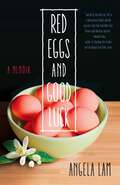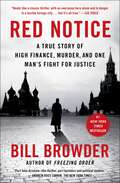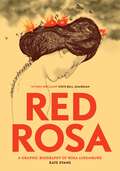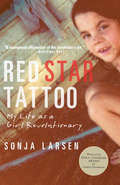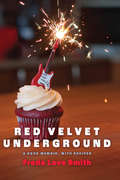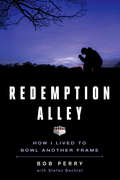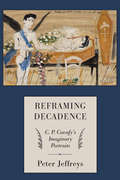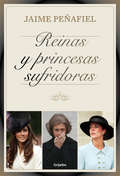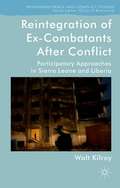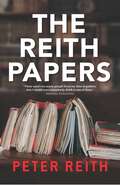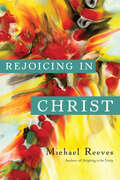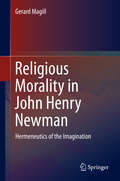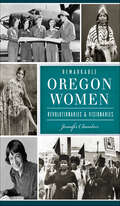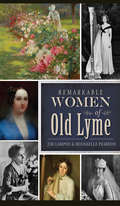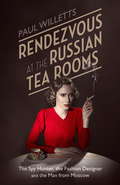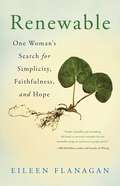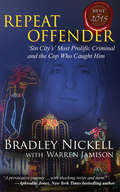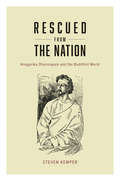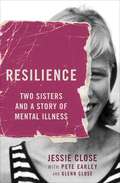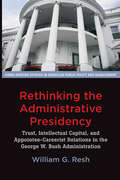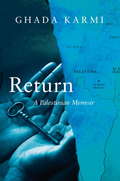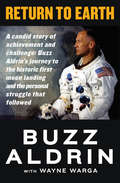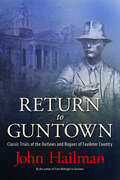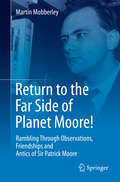- Table View
- List View
Red Eggs and Good Luck: A Chinese-American Memoir about Faith, Family, and Forgiveness
by Angela LamIn China, girls are bad luck and are often drowned. But Angela and her sisters are lucky. They are born in America and allowed to live two lives in one world: eating dim sum and praying the rosary; studying hard at school and playing make believe with their dolls. With a Chinese father who loves consumerism and an American mother determined to give her daughters the opportunities she was denied, Angela and her sisters grow up celebrating both their Chinese heritage and their American culture. But when their father suddenly becomes ill, Angela begins to question the limits of luck and the power of prayer—and to wonder whether she will ever find the courage to be herself.
Red Notice: A True Story of High Finance, Murder, and One Man's Fight for Justice
by Bill Browder<P>A real-life political thriller about an American financier in the Wild East of Russia, the murder of his principled young tax attorney, and his dangerous mission to expose the Kremlin's corruption. <P>Bill Browder's journey started on the South Side of Chicago and moved through Stanford Business School to the dog-eat-dog world of hedge fund investing in the 1990s. It continued in Moscow, where Browder made his fortune heading the largest investment fund in Russia after the Soviet Union's collapse. But when he exposed the corrupt oligarchs who were robbing the companies in which he was investing, Vladimir Putin turned on him and, in 2005, had him expelled from Russia. <P> In 2007, a group of law enforcement officers raided Browder's offices in Moscow and stole $230 million of taxes that his fund's companies had paid to the Russian government. Browder's attorney Sergei Magnitsky investigated the incident and uncovered a sprawling criminal enterprise. A month after Sergei testified against the officials involved, he was arrested and thrown into pre-trial detention, where he was tortured for a year. On November 16, 2009, he was led to an isolation chamber, handcuffed to a bedrail, and beaten to death by eight guards in full riot gear. <P>Browder glimpsed the heart of darkness, and it transformed his life: he embarked on an unrelenting quest for justice in Sergei's name, exposing the towering cover-up that leads right up to Putin. <P>A financial caper, a crime thriller, and a political crusade, Red Notice is the story of one man taking on overpowering odds to change the world. <P><b>A New York Times Bestseller</b>
Red Rosa: A Graphic Biography of Rosa Luxemburg
by Kate EvansA graphic novel of the dramatic life and death of German revolutionary Rosa LuxemburgA giant of the political left, Rosa Luxemburg is one of the foremost minds in the canon of revolutionary socialist thought. But she was much more than just a thinker. She made herself heard in a world inimical to the voices of strong-willed women. She overcame physical infirmity and the prejudice she faced as a Jew to become an active revolutionary whose philosophy enriched every corner of an incredibly productive and creative life—her many friendships, her sexual intimacies, and her love of science, nature and art.Always opposed to the First World War, when others on the German left were swept up on a tide of nationalism, she was imprisoned and murdered in 1919 fighting for a revolution she knew to be doomed.In this beautifully drawn work of graphic biography, writer and artist Kate Evans has opened up her subject&’s intellectual world to a new audience, grounding Luxemburg&’s ideas in the realities of an inspirational and deeply affecting life.
Red Star Tattoo
by Sonja LarsenFrom hardscrabble Milwaukee to dreamy Hawaii, from turbulent Montreal to free-spirited California, Red Star Tattoo is Sonja Larsen's unforgettable memoir of a young life spent on the move. By the age of 16, Sonja joins a cult-like communist organization in Brooklyn--unaware of the dark nature of what awaits her.A small, skinny 8-year-old girl holding a teddy bear stands by the side of a country road with a young man she barely knows. They're hitchhiking from a commune in Quebec to one in California. It is 1973 and somehow the girl's parents think this is a good idea. Sonja Larsen's is a childhood in which family members come and go and where freedom is both a gift and a burden. Her mother, thrown out of home as a pregnant teenager by her evangelical preacher father, is drawn to the utopian ideals and radical politics of communism. Her aunt Suzie is gripped by schizophrenia, her behaviour so erratic she eventually loses custody of her daughter. And then there is her cousin Dana, shunted back and forth long-distance between her parents--Dana, whose own need to escape leads to tragedy. Looking for a sense of family, searching to belong, to have your life mean something--this is what all these girls and young women share. As a teenager, Larsen moves to Brooklyn, embedding herself with an organization known publicly as the National Labor Federation and privately as the Communist Party USA Provisional Wing. Over her three years at the organization's national headquarters, Larsen works sixteen-hour day, eager to prove herself. Noticed and encouraged by the Old Man, the organization's charismatic leader, he makes her one of his "special girls," as well as the youngest member of the organization's militia and part of its inner circle. But even as she and her comrades count down the days on the calendar until the dawning of their new American revolution, Larsen's doubts about the cause and the Old Man become increasingly difficult to ignore. Red Star Tattoo explores the seductions and dangers of extremism, and asks what it takes to survive a childhood scarred by loss, abuse and the sometimes violent struggle for belonging.From the Hardcover edition.
Red Velvet Underground: A Rock Memoir, with Recipes
by Freda Love Smith“Not only a rock memoir and recipe book but also a poignant work of personal self-discovery and the challenges yet joys of parenting.” —Huffington PostPart memoir, part cookbook, and all rock and roll, Red Velvet Underground tells the story of how musician Freda Love Smith’s indie-rock past grew into her family—and food-centric present.Smith, born in Nashville and raised in Indiana, is best known as the drummer and co-founder of bands such as the Boston-based Blake Babies, Antenna, and the Mysteries of Life. Red Velvet Underground is loosely framed around cooking lessons Smith gave to her eldest son, Jonah, before he left for college. Smith compares her son’s experiences to her own—meeting Juliana Hatfield and starting the Blake Babies, touring in Evan Dando’s hand-me-down station wagon, and crashing with Henry Rollins, who introduced the band to local California fare—all while plumbing the deeper meanings behind the role of food, cooking, and family.Interspersed throughout these stories are forty-five flexitarian recipes—mostly, but not exclusively, vegetarian—such as red pepper-cashew spread, spinach and brazil nut pesto, and vegan strawberry-cream scones. Throughout the book, Smith reveals how food, in addition to music, has evolved into an important means for creativity and improvisation. Red Velvet Underground is an engaging exploration of the ways food and music have informed identity through every stage of one woman’s life.“These are sweet, unsentimental scenes from the ever-evolving life of a woman of many shifting and balancing roles: mother, wife, drummer, student, teacher, friend, daughter, food enthusiast. It’s all tied together with tantalizing recipes that have been lovingly improvised and tweaked into a life-affirming doneness.” —Juliana Hatfield, musician
Redemption Alley: How I Lived to Bowl Another Frame
by Stefan Bechtel Bob PerryAfter hitting rock bottom through addiction, bowling legend Bob Perry learned that religion is for people who don't want to go to hell. Spirituality is for people who have already been there. Perry tells his heart-wrenching, inspiring story of bowling for the mob and drug and alcohol addiction in his new book, Redemption Alley.Perry, considered by many to be one of the most naturally-talented bowlers in the history of the sport, had potential to become one of the best even at the young age of 12. Unfortunately, he grew up in 1970's Paterson, New Jersey, where everyone knew someone who was "connected"—with the mob, that is. Instead of training for championships, Perry began doing odd jobs for wiseguys and hustling hundreds of thousands of dollars in after-house "action bowling" for John Gotti, who later became the boss of the Gambino crime family. Perry's connections with organized crime eventually landed him in federal prison, but not before he became addicted to crack cocaine, alcohol, and painkillers and was homeless on the streets of New York. Ultimately, Perry washed up on the shores of St. Christopher's Inn, a shelter run by Franciscan monks. It was there that he had six fateful encounters with an angelic messenger who no one else could see-a monk whose message was so powerful that Bob Perry has now been sober for 22 years.In Redemption Alley, Perry not only shares his remarkable story of bowling success, his dangerous association with hoodlums and gangsters, and his recovery from addiction, but also his inspiring, decades-long spiritual quest, and his sober journey back into the bowling world.
Reframing Decadence: C. P. Cavafy's Imaginary Portraits
by Peter JeffreysDuring his sojourn in England during the 1870s, a young Cavafy found himself enthralled by the aesthetic movement of cosmopolitan London. It was during these years that he encountered the canvases and personalities of Pre-Raphaelite painters, including Burne-Jones and Whistler, as well as works of aesthetic writers who were effecting a revolution in British literary culture and channeling influences from France that would gradually coalesce into an international decadent movement. In Reframing Decadence Peter Jeffreys returns us to this critical period of Cavafy's life, showing the poet's creative indebtedness to British and French avant-garde aesthetes whose collective impact on his poetry proved to be profound. In the process, Jeffreys offers a critical reappraisal of Cavafy’s relation to Victorian aestheticism and French literary decadence. Foremost among the tropes of decadence that captivated Cavafy were the decline of imperial Rome, the rise of Christianity, and the lingering twilight of Byzantium. The influence of Walter Pater on Cavafy’s view of classical and late-antique history was immense, inflected as it was with an unapologetic homoerotic aesthetic that Cavafy would adopt as his own, making Pater’s imaginary portraits an important touchstone for his own historicizing poetry. Cavafy would move beyond Pater to explore a more openly homoerotic sensuality but he never quite abandoned this rich Victorian legacy, one that contributed greatly to his emergence as a global poet. Jeffreys concludes by considering Cavafy’s current popularity as a gay poet and his curious relation to kitsch as manifest in his ongoing popularity via translation and visual media.
Reinas y princesas sufridoras
by Jaime PeñafielUn recorrido por los episodios más delicados de las reinas y princesas del siglo XX y XXI de la mano de Jaime Peñafiel, uno de los expertos más reconocidos y polémicos en casas reales. Esta es la historia de unas reinas y unas princesas, guapas, jóvenes, enamoradas y felices el día de su boda, el día que se supone tiene que ser el más dichoso. Salvo la triste y comentadísima excepción de Charlène de Mónaco, todas lucían la mejor de sus sonrisas ante los miles de flashes que inmortalizaban su amor. Pero, para muchas, el camino no había sido nada fácil: atrás quedaban, como en el caso de Beatriz de Holanda o de Victoria de Suecia, la férrea oposición de sus padres y de la sociedad, que no veían con buenos ojos a un «príncipe» con un pasado poco ejemplar. Otras tuvieron que soportar multitud de críticas y comentarios porque no se las consideraba apropiadas -Sonia de Noruega, Grace de Mónaco, Letizia- y algunas han sufrido la humillación de saber que sus consortes compartían lecho con otras mujeres: Diana de Gales, Paola de Bélgica... Y, entre otras, doña Sofía, la principal protagonista de este libro y realísima sufridora esposa, una reina, una profesional, que siempre ha sabido estar en su sitio aunque haya sido a costa de mucho dolor, sufrimiento, silencio y públicos desplantes.
Reintegration of Ex-Combatants After Conflict
by Walt KilroyReintegration programmes for ex-combatants are supposed to support the wider peace process. This study looks at the way they were carried out in Sierra Leone and Liberia and assesses the degree to which they were conducted in a participatory way. To a large extent, ex-combatants felt that they had received unreliable information and had been afforded little input in the process. Others, whose experience had been more participatory, were faring better in terms of work, economic situation andcommunity relations. Reintegration of Ex-Combatants After Conflict is based on detailed interviews with a wide range of stakeholders, and on a survey and focus group discussions with ex-combatants. Their voices are clearly heard, in both the qualitative and quantitative data. Kilroy explores the important implications for the effect of reintegration programmes on the wider peacebuilding project. Social capital, which affects the peace process, is also highlighted, as the extent to which this can be created or undermined depends on the way the programmes were conducted. Kilroy's insightful study will appeal to all those with an interest in conflict resolution, post-war recovery, and development.
Reith Papers
by Peter ReithPeter Reith was a senior cabinet minister under John Howard from 1996 to 2001. He was the face of the government's tough waterfront reforms and architect of sweeping industrial laws, a major contributor to the Fightback policy, a potential leader of the Liberal Party, a key player in the introduction of the GST, an influential republican in the 1999 referendum and Minister for Defence during the time that it was wrongly claimed that asylum seekers had thrown their children overboard.A relentless diary keeper, Peter Reith kept extensive records of those tumultuous years in over a hundred notebooks he filled with recollections of conversations with his colleagues, discussions in cabinet and his private views and predictions.The Reith Papers is the best of those diary entries from the heart of a government that changed Australia.
Rejoicing in Christ
by Michael Reeves2016 Christianity Today Beautiful Orthodoxy Book of the Year Finalist
Religious Morality in John Henry Newman
by Gerard MagillThis book is a systematic study of religious morality in the works of John Henry Newman (1801-1890). The work considers Newman's widely discussed views on conscience and assent, analyzing his understanding of moral law and its relation to the development of moral doctrine in Church tradition. By integrating Newman's religious epistemology and theological method, the author explores the hermeneutics of the imagination in moral decision-making: the imagination enables us to interpret complex reality in a practical manner, to relate belief with action. The analysis bridges philosophical and religious discourse, discussing three related categories. The first deals with Newman's commitment to truth and holiness whereby he connects the realm of doctrine with the realm of salvation. The second category considers theoretical foundations of religious morality, and the third category explores Newman's hermeneutics of the imagination to clarify his view of moral law, moral conscience, and Church tradition as practical foundations of religious morality. The author explains how secular reason in moral discernment can elicit religious significance. As a result, Church tradition should develop doctrine and foster holiness by being receptive to emerging experiences and cultural change. John Henry Newman was a highly controversial figure and his insightful writings continue to challenge and influence scholarship today. This book is a significant contribution to that scholarship and the analysis and literature comprise a detailed research guide for graduates and scholars.
Remarkable Oregon Women: Revolutionaries & Visionaries (American Heritage)
by Jennifer ChambersWithout the efforts of inspiring, brave women of the past, the progressive and individualistic Oregon we know today might not exist. From native tribes and Oregon Trail pioneers to Victorian suffragists and unlikely politicians, strong female leaders give profound meaning to the state motto, alis volat propriis--she flies with her own wings. Writer and activist Julia Ruuttila fought for the rights of the citizens of Vanport, the largely African American town lost to a disastrous flood in 1948. Others broke stereotypes to serve their communities, like women who helped build ships during World War II and the nation's first female police officer, Portland's own Lola Baldwin. Similarly, Laura Stockton Starcher unseated her husband as mayor of Umatilla. Author Jennifer Chambers tells these and many more stories of progressive, radical women who fought for change within their state.
Remarkable Women of Old Lyme (American Heritage)
by Jim Lampos Michaelle PearsonOld Lyme's illustrious history owes much to innovative women. Suffragist Katharine Ludington was co-founder of the League of Women Voters. In the 1830s, Phoebe Griffin Noyes started a school for art and general subjects. At the turn of the twentieth century, Florence Griswold welcomed the artists of the Lyme Art Colony by creating the "Birthplace of American Impressionism." By World War II, Teddy Kenyon had made her mark as a test pilot. Old Lyme's artistic tradition was continued by Elisabeth Gordon Chandler, who founded the Lyme Academy College of Fine Arts in 1976. Authors Michaelle Pearson and Jim Lampos honor the women whose triumphs made Old Lyme the popular summer resort and artists' colony it is today.
Rendezvous at the Russian Tea Rooms: The Spyhunter, the Fashion Designer & the Man From Moscow
by Paul WillettsRendezvous at the Russian Tea Rooms provides the first comprehensive account of what was once hailed by a leading American newspaper as the greatest spy story of World War II. This dramatic yet little-known saga, replete with telephone taps, kidnappings, and police surveillance, centres on the furtive escapades of Tyler Kent, a handsome, womanising 28-year-old Ivy League graduate, who doubles as a US Embassy code clerk and Soviet agent. Against the backdrop of London high society during the so-called Phoney War, Kent's life intersects with the lives of the book's two other memorably flamboyant protagonists. One of those is Maxwell Knight, an urbane, endearingly eccentric MI5 spyhunter. The other is Anna Wolkoff, a White Russian fashion designer and Nazi spy whose outfits are worn by the Duchess of Windsor and whose parents are friends of the British royal family. Wolkoff belongs to a fascist secret society called the Right Club, which aims to overthrow the British government. Her romantic entanglement with Tyler Kent gives her access to a secret correspondence between President Roosevelt and Winston Churchill, a correspondence that has the potential to transform the outcome of the war.
Renewable: One Woman's Search for Simplicity, Faithfulness, and Hope
by Eileen FlanaganAt age forty-nine, Eileen Flanagan had an aching feeling that she wasn&’t living up to her potential—or her youthful ideals. A former Peace Corps volunteer who&’d once loved the simplicity of living in a mud hut in Botswana, she now had too many e-mails in her inbox and a basement full of stuff she didn&’t need. Increasingly worried about her children&’s future on a warming planet, she felt unable to make a difference—until she joined a band of singing Quaker activists who helped her find her voice and her power. Renewable: One Woman&’s Search for Simplicity, Faithfulness, and Hope is the story of a spiritual writer and mother of two who, while trying to change the world, unexpectedly finds the courage to change her life. With wit and wisdom, Eileen Flanagan shares the engaging journey that brings her from midlife spiritual crisis to fulfillment and hope—and, briefly, to jail.
Repeat Offender: 'Sin City's' Most Prolific Criminal and the Cop Who Caught Him
by Bradley Nickell Warren JamisonA Suspense Magazine Best True Crime Book. &“Mayhem, madness, and suspense . . . with shocking twists and turns that will keep you riveted!&” —Aphrodite Jones, New York Times–bestselling author and host of True Crime with Aphrodite Jones Las Vegas Police Det. Bradley Nickell brings you the inside scoop on the investigation of the most prolific repeat offender Las Vegas has ever known. Daimon Monroe looked like an average guy raising a family with his diffident schoolteacher girlfriend. But just below the surface, you&’ll learn he was an accomplished thief with an uncontrollable lust for excess. His criminal mind had no bounds—he was capable of anything given the proper circumstances. You will be revolted by Monroe&’s wealth amassed through thievery, his plot to kill Det. Nickell, a judge, and a prosecutor, and the physical and sexual abuse to which Monroe subjected his daughters. &“An action-packed, fast-paced true crime thriller from a real-life &‘Sin City&’ cop depicting his battle with a notorious, and dangerous, Las Vegas criminal.&” —Steve Jackson, New York Times–bestselling author of Bogeyman and A Clockwork Murder &“A gripping, true story of a prolific recidivist serial criminal, and the relentless police detective who took him down, despite threats against himself and his family. Heart-pounding at times. An absolute must have book for all crime readers.&” —RJ Parker, bestselling author of Revenge Killings The author is donating 10 percent of the proceeds for the sale of the book to the Rape Crisis Center of Las Vegas
Reporting the First World War: Charles Repington, The Times and the Great War, 1914–1918 (Cambridge Military Histories)
by A. J. A. MorrisCharles Repington was Britain's most influential military correspondent during the first two decades of the twentieth century. From 1914 to 1918, Repington's commentary in The Times, 'The War Day by Day', was read and discussed by opinion-shapers and decision-makers worldwide who sought to better understand the momentous events happening around them, and his subsequently published diaries offered a compelling portrait of England's governing class at war. This is the first major study of Repington's life and career from the Boer War to the end of the Great War. A. J. A. Morris presents unique insights into the conduct of the First World War and into leading figures in the British high command: French, Haig, Robertson, Wilson. The book offers modern readers a rewardingly fresh understanding of the conflict, and will appeal to scholars of the First World War and British political and military history of the period. First major study of Charles Repington, Britain's most influential military correspondent of the early twentieth century. Examines Repington's daily column in The Times during the Great War, and how it helped shape understanding of the war's events. Presents unique insights into the conduct of the First World War and into leading figures in the British high commands.
Rescued from the Nation: Anagarika Dharmapala and the Buddhist World
by Steven KemperAnagarika Dharmapala is one of the most galvanizing figures in Sri Lanka’s recent turbulent history. He is widely regarded as the nationalist hero who saved the Sinhala people from cultural collapse and whose "protestant” reformation of Buddhism drove monks toward increased political involvement and ethnic confrontation. Yet as tied to Sri Lankan nationalism as Dharmapala is in popular memory, he spent the vast majority of his life abroad, engaging other concerns. In Rescued from the Nation, Steven Kemper reevaluates this important figure in the light of an unprecedented number of his writings, ones that paint a picture not of a nationalist zealot but of a spiritual seeker earnest in his pursuit of salvation. Drawing on huge stores of source materials--nearly one hundred diaries and notebooks--Kemper reconfigures Dharmapala as a world-renouncer first and a political activist second. Following Dharmapala on his travels between East Asia, South Asia, Europe, and the United States, he traces his lifelong project of creating a unified Buddhist world, recovering the place of the Buddha’s Enlightenment, and imitating the Buddha’s life course. The result is a needed corrective to Dharmapala’s embattled legacy, one that resituates Sri Lanka’s political awakening within the religious one that was Dharmapala’s life project.
Resilience: Two Sisters and a Story of Mental Illness
by Pete Earley Glenn Close Jessie CloseAt a young age, Jessie Close struggled with symptoms that would transform into severe bipolar disorder in her early twenties, but she was not properly diagnosed until the age of fifty. Jessie and her three siblings, including actress Glenn Close, spent many years in the Moral Re-Armament cult. Jessie passed her childhood in New York, Switzerland, Connecticut, Zaire (now the Democratic Republic of Congo), and finally Los Angeles, where her life quickly became unmanageable. She was just fifteen years old.Jessie's emerging mental illness led her into a life of addictions, five failed marriages, and to the brink of suicide. She fought to raise her children despite her ever worsening mental conditions and under the strain of damaged romantic relationships. Her sister Glenn and certain members of their family tried to be supportive throughout the ups and downs, and Glenn's vignettes in RESILIENCE provide an alternate perspective on Jessie's life as it began to spiral out of control. Jessie was devastated to discover that mental illness was passed on to her son Calen, but getting him help at long last helped Jessie to heal as well. Eleven years later, Jessie is a productive member of society and a supportive daughter, mother, sister, and grandmother. In RESILIENCE, Jessie dives into the dark and dangerous shadows of mental illness without shying away from its horror and turmoil. With New York Times bestselling author and Pulitzer Prize finalist Pete Earley, she tells of finally discovering the treatment she needs and, with the encouragement of her sister and others, the emotional fortitude to bring herself back from the edge.
Rethinking the Administrative Presidency: Trust, Intellectual Capital, and Appointee-Careerist Relations in the George W. Bush Administration (Johns Hopkins Studies in American Public Policy and Management)
by William G. ReshThe first book to explore the tension between presidents and federal agencies from the perspective of careerists in the executive branch.Winner of the Herbert A. Simon Book Award of the American Political Science AssociationWhy do presidents face so many seemingly avoidable bureaucratic conflicts? And why do these clashes usually intensify toward the end of presidential administrations, when a commander-in-chief’s administrative goals tend to be more explicit and better aligned with their appointed leadership’s prerogatives? In Rethinking the Administrative Presidency, William G. Resh considers these complicated questions from an empirical perspective.Relying on data drawn from surveys and interviews, Resh rigorously analyzes the argument that presidents typically start from a premise of distrust when they attempt to control federal agencies. Focusing specifically on the George W. Bush administration, Resh explains how a lack of trust can lead to harmful agency failure. He explores the extent to which the Bush administration was able to increase the reliability—and reduce the cost—of information to achieve its policy goals through administrative means during its second term.Arguing that President Bush's use of the administrative presidency hindered trust between appointees and career executives to deter knowledge sharing throughout respective agencies, Resh also demonstrates that functional relationships between careerists and appointees help to advance robust policy. He employs a "joists vs. jigsaws" metaphor to stress his main point: that mutual support based on optimistic trust is a more effective managerial strategy than fragmentation founded on unsubstantiated distrust.
Return
by Ghada KarmiAn extraordinary memoir of exile and the impossibility of finding home, from the author of In Search of Fatima"The journey filled me with bitterness and grief. I remember looking down on a nighttime Tel Aviv from the windows of a place taking me back to London and thinking hopelessly, 'flotsam and jetsam, that's what we've become, scattered and divided. There's no room for us or our memories here. And it won't be reversed.'" Having grown up in Britain following her family's exile from Palestine, doctor, author and academic Ghada Karmi leaves her adoptive home in a quest to return to her homeland. She starts work with the Palestinian Authority and gets a firsthand understanding of its bizarre bureaucracy under Israel's occupation. In her quest, she takes the reader on a fascinating journey into the heart of one of the world's most intractable conflict zones and one of the major issues of our time. Visiting places she has not seen since childhood, her unique insights reveal a militarised and barely recognisable homeland, and her home in Jerusalem, like much of the West Bank, occupied by strangers. Her encounters with politicians, fellow Palestinians, and Israeli soldiers cause her to question what role exiles like her have in the future of their country and whether return is truly possible.From the Hardcover edition.
Return to Earth
by Buzz Aldrin Wayne WargaBuzz Aldrin's courageous, inspiring account of fame and depression following Apollo 11 When Buzz Aldrin returned victorious from the Apollo 11 mission as one of the first men to have walked on the moon, he didn't realize that, in other ways, his odyssey had just begun. "There was a jolt as the small drogue chutes opened," Aldrin relates in the opening passages of Return to Earth, remembering his abrupt descent into the gravity of the blue planet. "We landed with all the grace of a freight elevator." And with that atmospheric splash, Aldrin and coauthor Wayne Warga take us on a journey through the human side of the space program as the astronaut learns to cope with the sudden pressures of being a lionized public persona. In honest, stripped-away prose, Aldrin reveals a side of instant fame for which neither West Point nor NASA could have ever prepared him. One minute a fighter pilot and engineer, the next a cultural icon burdened with the adoration of thousands, Aldrin gives a candid account of the depression that resulted from trying to be too many things to too many people, leading the astronaut to later remark, "I traveled to the moon, but the most significant voyage of my life began when I returned from where no man had been before." Speaking openly about the affair that threatened his marriage and the concerns that plagued him upon returning from the historic mission, Aldrin pens a compelling memoir that also serves as an excellent guide for those times in life when power and success conspire to corrupt even the best of us.
Return to Guntown: Classic Trials of the Outlaws and Rogues of Faulkner Country
by John HailmanA federal prosecutor in Mississippi for over thirty years, John Hailman routinely worked with federal agents, lawyers, judges, and criminals of every type imaginable. Encouraged by the acclaim for his earlier book, From Midnight to Guntown, he has opened even more of the astonishing cases within the over thirty-five boxes full of trial stories he carried into retirement. Hailman gathers colorful exploits of eccentric modern criminals from William Faulkner's Mississippi, where savvy victims often outwit their criminal perpetrators. Characters range from rich but incompetent drug lords and nationwide gun-runners to bumbling Dixie Mafia kidnappers. The book ends with “Fancy Frauds” in which ingenious con men (and women) offer hilarious but surprisingly sophisticated “special deals” on tax-free gold mines in Mexico and bargain (but bogus) Viagra. Chapters include “Guns, Bombs, and Moonshine Whiskey,” “Drug Kingpins Have Troubles Too,” “Crime Victims Fight Back,” “Mere Theft,” and “Fancy Frauds.” Written to entertain and enlighten, these stories will delight any fan of the true crime genre and anyone who enjoys good writing and the skill of a master storyteller.
Return to the Far Side of Planet Moore!
by Martin MobberleyThe result of an exhaustive study of Sir Patrick Moore's observations of the Moon and planets for more than 60 years, this book is a fantastic companion to the extremely popular, "It Came From Outer Space Wearing an RAF Blazer!" written by the same author. Moore recorded his telescopic observations in his logbooks, which are reproduced and described here in detail, along with his sketches and notes. In this light, the author discusses the factors that caused Moore to switch from lunar observing to planetary and variable star observing. He has also included personal recollections and humorous anecdotes from Moore's friends and acquaintances, as well as a look at his best loved books. Further chapters describe Moore's foreign travels and correspondence with those back home. Lastly, the author has not neglected a few of Moore's most memorable television and radio appearances, which are examined along with a close up of what it was like to visit Moore's beloved home of Farthings in Selsey. Essentially, this is a book written by popular demand from the readers of the author's original biography, who craved more of Moore!
